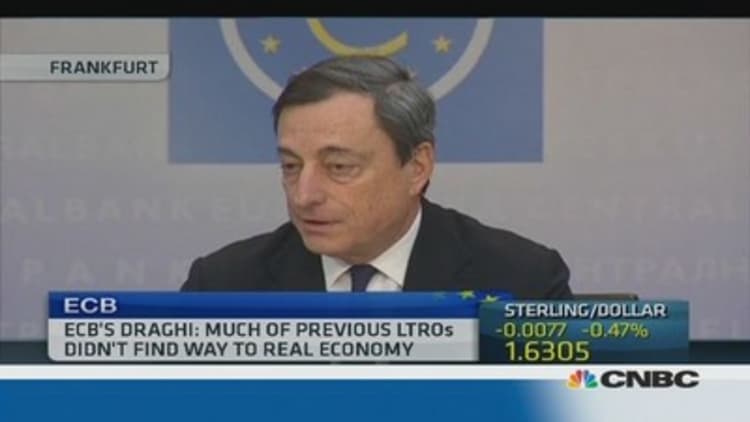
The European Central Bank (ECB) on Thursday left its benchmark interest rate unchanged at 0.25 percent as expected, after surprising markets with a rate cut last month.
It also kept its forecast for an economic contraction of 0.4 percent in the euro zone in 2013. For 2014, it expects growth of 1.1 percent, a slight improvement on the 1.0 percent seen in September. For 2015 it forecast growth of 1.5 percent.
At a press conference, ECB President Mario Draghi said that risks to its economic outlook remained on the downside. He also warned the euro zone could face a lengthy bout of low inflation.
(Read more: Euro zone gets manufacturing boost, France drags)
"We may experience a prolonged period of low inflation, to be followed by a gradual upward movement towards inflation rates below, but close to, 2 percent on," Draghi said. The ECB's inflation target 2 percent.
The ECB sees inflation at 1.4 percent in 2013, 1.1 percent in 2014 and 1.3 percent in 2015 — well below its target of close to 2 percent. Both the 2013 and 2014 inflation forecasts have been revised down slightly since September.
"We are monitoring developments closely and are ready to consider all available instruments," Draghi said.
But Carsten Brzeski, senior economist at ING, said Draghi was "rather unclear" on how and when the ECB would act if deflation loomed.
"In our view, Draghi's comments can be rephrased as: if deflationary forces increase and/or headline inflation drops unexpectedly, the ECB will ease further," he said in a research note.
"Bolder steps that could be a major step to repair the monetary policy transmission mechanism, however, are technically hard to implement and clearly controversial within the Governing Council. Reverting to rather traditional interest rate cuts could eventually still turn out to be the ECB's first answer to new deflation risks."
(Read more: As you were? Europe deflation fears despite upbeat data)
Draghi said the ECB Governing Council had briefly discussed using negative deposit rates, a measure that has been regularly touted in the media and which would see euro zone banks charged for depositing cash at the ECB.
Other policy tools available to Draghi include those aimed at improving liquidity conditions for banks, such as further long-term refinancing operations (LTROs), which see the central bank lend money at very low interest rates to banks in an effort to boost lending to businesses and consumers.
"If we are to do an operation similar to the LTRO, we're going to make sure this is being used for the economy," Draghi said at the press conference. "And we'll make sure this operation is not going to be used for subsidizing capital formation by the banking system in these carry trade operations."
The ECB's rate decision came amid tentative signs of economic recovery in the euro zone, which grew by a meager 0.1 percent in the third quarter, after exiting the longest contraction in continental Europe in over 40 years. The European Commission expects the region's economy to expand by 1.1 percent in 2014.
(Read more: Is the euro zone already running out of good news?)
The euro edged up as Draghi spoke, before falling back slightly against the dollar to $1.36.
Kathleen Brooks, research director of Forex.com, said the move might have been more about the dollar than the euro.
"The ECB did not discuss a potential rate cut at this meeting and even with the fall in inflation in recent months, the bank still believes that long-term inflation expectations are firmly anchored," she said in a note.
"There had been some (unjustified in my view) expectations that Draghi and co could dangle the prospect of quantitative easing or other radical action in front of the markets, to show off their deflation fighting credentials. However, he was hardly hawkish, and instead stuck to his most recent dovish tone and reinforced the ECB's forward guidance to keep policy loose for a prolonged period."
Follow us on Twitter: @CNBCWorld

